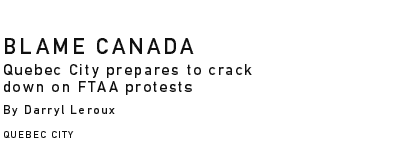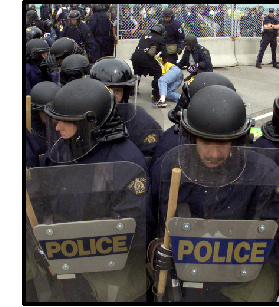
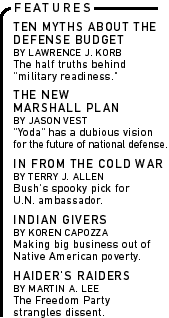
|
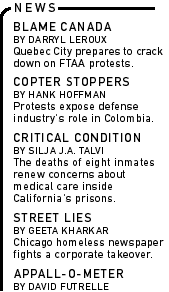
|
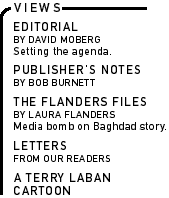
|
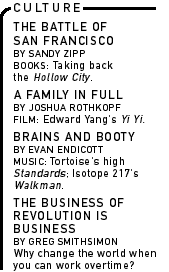
|
| |
|
|
|
Since the anti-WTO demonstrations in Seattle, police forces around the world increasingly have demonstrated their willingness to crack down on anti-globalization protests. Canadian officials are keeping such lessons in mind as they plan their own response to the upcoming Summit of the Americas in Quebec City, where tens of thousands of protesters are expected. From April 20 to 22, Quebec City will host 34 heads of state for the summit, who will focus on finalizing the controversial Free Trade Area of the Americas (FTAA) agreement. The FTAA would extend NAFTA to every country in the Western Hemisphere except Cuba. The trade pact has been the subject of secretive negotiations since the first summit was held in Miami in 1994, and negotiators have set 2005 as the deadline for implementation. The security measures planned for the summit are sweeping--it will be the largest
Authorities have established a "security perimeter," a no-protest zone that will cover four square miles of downtown. In early spring, police plan to erect a fence along the streets that line the perimeter to block protesters from the meetings. What's more, the 25,000 people who reside or work in the security perimeter will have to show a pass to enter the area, as will the 5,000 official delegates and 3,000 accredited journalists. A plan to run criminal-record checks on all Quebec residents receiving the pass was quickly shelved due to widespread public outrage. At a November press conference, Serge Menard, Quebec's minister for public security, surprised many when he announced that Orsainville provincial prison will be emptied of its 600 inmates during the summit to make room for arrested protesters. Quebec officials plan to transfer all prisoners to other facilities across the province. Menard justified the need for such drastic police measures by saying, "If you want peace, you must prepare for war." In December, the RCMP announced that it had rented all vacant apartments and houses within the security perimeter, and reserved all hotel accommodations within 55 miles to avoid leaving anything vacant for protesters. The RCMP even forced out several NGOs that had reserved hotel and conference rooms a year in advance. They also plan to seal all sewer entrances within the security perimeter for fear of protesters finding their way through the underground maze and onto the laps of government officials and business executives. Canadian officials recently extended their oppressive policies to U.S. citizens. In a late January border incident, 10 New Yorkers en route to a meeting organized by the Summit of the Americas Welcoming Committee were denied entry into the country. Canadian border police searched their van, collecting and copying all documents pertaining to the mobilization against the summit. More recently, former black panther Lorenzo Komboa Ervin of Kalamazoo, Michigan was denied entry into Canada after speaking about police brutality, racism and the FTAA at February events in Toronto, Montreal and Quebec City. Canadian immigration officials told Ervin that before he can re-enter Canada, he must provide evidence that he is no longer a "clear and present danger" to state security--even though he has been to Canada nearly 20 times in the past five years. In Quebec City, the paranoia surrounding the summit is reaching a fever pitch. On February 4, two plainclothes police officers arrested three youths for handing out pamphlets denouncing the summit security's violation of civil rights. Mayor Jean-Paul L'Allier quickly apologized for the officers' actions once the story became public. In response, the Rights and Liberties League of Quebec, one of the province's largest civil rights organizations, is forming a surveillance committee made up of lawyers and community members who will report on security measures, provide legal representation to arrested protesters and help those who encounter problems at the Canadian border. Meanwhile, the RCMP continues to portray the summit as a "crisis
situation," thereby justifying all police actions. When asked about
the security measures infringing on civil rights, Julie Brongel,
RCMP's spokeswoman for the summit said: "If they want to put this
in a negative light, they're entitled to do so. But it's not going
to change our methods." For more information on the anti-FTAA organizing, visit our links page. |

